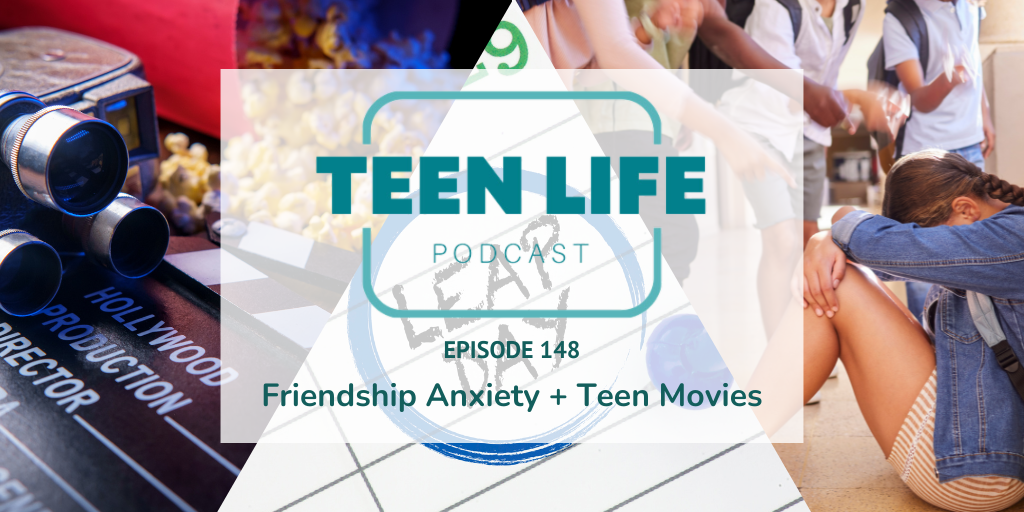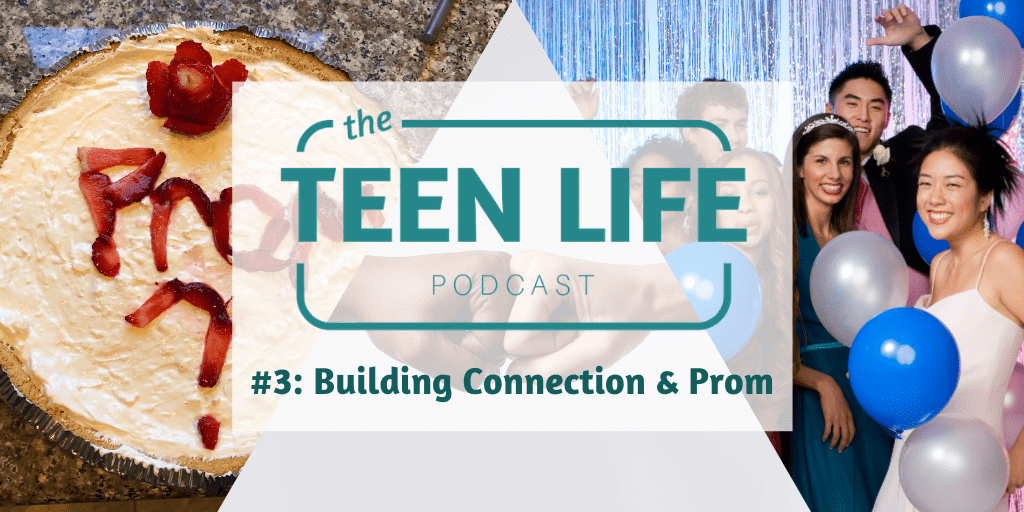Podcast: Play in new window | Download
Friendship Anxiety: A Guide for Teens and Parents
If you are experiencing friendship anxiety, you are not alone!
It’s easy to feel overwhelmed by the pressure to fit in and maintain a wide circle of friends. And let’s be honest, social media instills us all with FOMO. After all, it seems like everyone is having a great time. And if you’re not there, do you even have friends at all?
The more connected we are, the more we can feel disconnected and anxious about whether or not we are living up to expectations.
Fortunately, there are strategies to cope with friendship anxiety and cultivate healthy relationships.
Understanding Friendship Anxiety
Friendship anxiety can manifest in various ways, whether it’s stress about finding friends, feeling left out in social situations, or dealing with the dynamics of existing friendships. Interestingly, studies have shown that humans have a natural limit to our social networks. This is often referred to as “Dunbar’s number.” According to Dunbar’s number, we can maintain stable relationships with around 150 individuals. However, in today’s digital age, teens are exposed to far more connections, especially through social media platforms like Instagram and Snapchat.
For teens who are already prone to people-pleasing or have developmental sensitivities, the pressure to navigate social interactions can be particularly intense. The constant need to monitor where their friends are, how they’re perceived online, and the fear of missing out can make friendship anxiety even worse.
Advice for Teens with Friendship Anxiety
Put Yourself Out There
Engage in activities or join clubs where you can meet like-minded peers.
Finding opportunities to connect with others who share similar interests is a fantastic way to break the ice and make new friends. Whether you’re passionate about sports, arts, or academics, there’s likely a club or group where you can meet people who share your enthusiasm. Joining a sports team not only provides a platform for physical activity but also allows you to connect with teammates. Similarly, participating in hobby groups or extracurricular activities allows you to bond with others over shared interests. It might sound scary, but even something as simple as striking up conversations with classmates during lunch breaks or study sessions can lead to lasting friendships. By putting yourself in social situations that match your interests, you increase the likelihood of finding friends who appreciate your unique qualities.
Practice Social Scripts
If initiating conversations feels daunting…
Socializing can be intimidating, especially if you’re unsure of what to say or how to start a conversation. Practicing social scripts can be incredibly beneficial. Take the time to think about common conversation starters or topics of interest, and rehearse them either alone or with a trusted adult. By familiarizing yourself with potential dialogue scenarios, you can alleviate some of the anxiety associated with initiating conversations. Remember, it’s okay to start with simple greetings or compliments, and gradually build rapport from there. Having a script as a guide can boost your confidence and make social interactions feel more natural and effortless.
Create Healthy Boundaries
If a particular friendship is causing significant anxiety or distress…
Not all friendships are meant to last, and that’s okay!
If you find yourself feeling consistently anxious or drained by a particular relationship, it may be time to reevaluate its dynamics. Creating healthy boundaries involves recognizing your own needs and prioritizing your well-being. This could mean taking a step back from a friendship that no longer serves you or setting clear expectations for how you want to be treated. Remember, quality trumps quantity when it comes to friendships, so focus on building relationships that make you feel good about yourself and support you. Surround yourself with people who respect your boundaries and encourage you to be the best version of yourself.
Embrace Alone Time
Recognize the importance of taking breaks and recharging your social batteries.
In a world that glorifies constant connection, it’s easy to overlook the value of time alone. However, spending time alone can be refreshing and essential for maintaining overall well-being. Embrace moments of solitude as opportunities to reflect, recharge, and indulge in activities that bring you joy. Whether it’s reading a book, going for a walk, or simply enjoying your own company, prioritize self-care and make time for activities that nourish your soul.
Remember, alone time isn’t a sign of isolation; it’s a valuable opportunity to reconnect with yourself and cultivate a deeper sense of self-awareness.
Learn to Say No
You don’t have to attend every social event or be friends with everyone.
It’s natural to want to please others and avoid disappointing them, but it’s essential to recognize your limits and prioritize your well-being. Learning to say no, whether it’s declining an invitation or setting boundaries with friends, is a crucial skill that fosters self-respect and autonomy. You are not obligated to attend every social event or be friends with everyone you encounter. It’s okay to decline invitations or politely decline requests that don’t align with your interests or values. Asserting boundaries usually makes you look cool, because everyone longs for that kind of self-respect. It also helps cultivate healthy, fulfilling relationships based on mutual understanding and respect.
When you respect yourself, others usually follow suit.
Offer Support
If a friend is going through a tough time…
True friendship goes beyond the good times; it’s about being there for each other in good times and bad. If a friend is facing challenges or going through a difficult period, don’t hesitate to reach out and offer your support. You don’t have to have all the answers or solve their problems, but lending a listening ear and showing empathy can make a world of difference. It’s enough to let them know that they’re not alone. Sometimes, all it takes is knowing that someone cares to you feel better when times are hard. Your support can make a profound impact and strengthen the bonds of friendship.
Advice for Parents
- Stay Curious
Check in on your teen’s friendships regularly and ask open-ended questions about their social experiences. Show genuine interest and offer support without judgment. - Provide a Safety Net
Be the “fall guy” if your teen needs an excuse to opt out of social situations that trigger anxiety. Establish code words or phrases that signal when they need a graceful exit. - Model Healthy Boundaries
Teach your teen the importance of setting boundaries in friendships and lead by example. Encourage open communication and validate their feelings when they express discomfort in certain relationships. - Avoid Comparison
Refrain from comparing your teen’s friendships to your own or those of others. Each person’s social journey is unique, and it’s essential to respect their individual experiences. - Offer Empathy
Be there for your teen when they’re struggling with friendship anxiety. Listen attentively, offer reassurance, and provide a supportive presence whenever they need to talk.
Also in this episode:
- The history and fun facts of Leap Year.
- Teen movies might not all be accurate, but some can offer insight into teen culture.
In this episode, we mentioned or used the following resources about friendship anxiety.
- Psychology Today: Anxiety and Friendships: New School Year, Fresh Start
- TIME: Social Media Has Made Teen Friendships More Stressful
- Podcast music by Luke Cabrera & Tobin Hodges
Have a question?
If you have a question about something you heard or just want to give us some feedback, please leave us a comment below. We would love to hear from you!
More Resources You Might Like

Karlie Duke
Communications Director

Tobin Hodges
Program Director

Caleb Hatchett
Podcast Host
Caleb Hatchett | Podcast Co-Host
Caleb loves helping teenagers take ownership of their faith and relationships. He graduated from Abilene Christian University with a degree in Youth and Family Ministry and is currently Student Ministry Director at Jenks Church in Oklahoma.
Tobin Hodges | Program Director
Tobin’s entire career has been centered around students and teens from all walks of life. He has a passion for helping teens be their best selves. As Program Director, he loves working directly with school staff and students through Teen Life Support Groups. Tobin has a Bachelor’s Degree in Music from Texas Tech University.
Karlie Duke | Director of Communications
Karlie has always had a heart for teenagers. Through her role at Teen Life, she loves to showcase the amazing stories coming out of Support Groups, but she is especially passionate about helping adults and teenagers find connection. Karlie has a BS in Communications with a minor in Family Studies from Abilene Christian University.












